Banished for life – for stealing a cart horse
During the days when convicts were transported to Australia, children as young as 11 and 12 were regularly sentenced to banishment Down Under.

But Shropshire's Charles Biffon was at the other end of the age scale – being well into his 80s when he was transported for life for stealing a cart horse in 1835, despite being of apparent "impaired intellect" and his co-accused showing signs of being insane.
Meanwhile transportation seems to have suited James Hardy Vaux, who was brought up in Shropshire and, as a repeat offender, was packed off to the other side of the world on three separate occasions.
Vaux became a celebrity convict who wrote his memoirs but ultimately died in obscurity.
The story of the age of transportation, which saw over 160,000 men, women, and children packed off to Australia and Tasmania between 1787 and 1868, is told in a new book by historian Lucy Williams called Convicts In The Colonies (Pen & Sword, £19.99).
Lucy has painstakingly gone through records in Australia to uncover some of the personal tales.
Some convicts viewed transportation as a fate literally worse than death to such an extent that a few even asked to hang in preference to being sent to Australia. Yet others looked forward to the prospect as being a lot better than being banged up in the grim and brutal prison hulks – ships turned into prisons – of the day.
According to Lucy's researches of the records, Newport-born Charles Biffon, whose name also appears in reports spelt as Biffin, was sentenced to transportation for life at the Shropshire Quarter Sessions in 1835 for horse stealing, and was transported to Van Diemen's Land – Tasmania – the following year at the age of 86.
This would have made him one of the oldest, but not the oldest, people ever to be transported, although the newspaper reports of his appearance at Shropshire Quarter Sessions gave his age as 83.
The case was reported in the Shrewsbury Chronicle of July 3, 1835: "CHARLES BIFFON, aged 83, and G. AUSTIN (alias Newton), were charged with stealing a horse from Mr George Bloor, of Drayton.
"The son of the prosecutor turned the horse into Rush-lane, on the Sunday before Newcastle fair. Biffon admitted to the constable that he had not sold the horse at Newcastle, but had left him in a lane near Batchare.
"Austin was present when Biffon put on the bridle and took the horse. Sentenced to transportation for life. The Chairman said it appeared doubtful whether Austin was of sound mind; he would therefore be imprisoned one month to ascertain the fact."
For its part the Salopian Journal and Courier of Wales' report of July 1 gave some additional information in that Austin was aged 30, and the cart horse was worth £2, and the crime was at Drayton-in-Hales. It added: "The old man appeared to be of impaired intellect, and there being a question as to the sanity of the other prisoner, he will undergo a period of imprisonment, in order to ascertain that fact, previous to the sentence being put in force."
After spending about a month in Shrewsbury jail, Biffon was moved to the Justitia, a prison hulk moored at Woolwich, to await transportation.
Other convicts taken from Shrewsbury jail with him at the same time were Richard Grice, transported for life for stealing a calf; and a number transported for seven years, comprising Samuel Morgan, who had stolen wearing apparel, Thomas Morris, for stealing stockings, John Hollingworth alias Ferguson, for stealing wearing apparel, and Edward Smith, for stealing a watch.
The make-up of the group underlines the fact that most transported convicts were guilty of property crimes.
Such was the case with James Hardy Vaux, who had been born in Surrey in 1782 but spent his early childhood with his maternal grandparents in Shropshire.
He became a serial fraudster and thief, but in view of his record had an amazing ability to win the confidence of the authorities. During his first stint in Australia he worked as a clerk, returning home a free man and returning immediately to his criminal ways. Caught and sentenced to death, he was reprieved on condition that he returned to Australia for the rest of his natural life.
Once again he became a clerk, married bigamously, and wrote his memoirs in 1817. Eventually he illegally fled to Ireland, where he was soon back to his old trick of forging banknotes, and was sentenced to return to New South Wales for seven years. Later he was convicted of indecent assault, and jailed for two years.
Lucy writes that Vaux would have been released in 1841, but no further records of his life in Australia are available. He was not convicted again and was not to return to public life. She thinks it unlikely he would have returned to Britain, and he may have died in Australia, although she says it is surprising that as a "celebrity" convict his death was never reported.
"What is most likely is that Vaux, on release from prison after a conviction for child abuse, made a quiet life for himself elsewhere in the colony of New South Wales, possibly adopting a new name, giving friends, neighbours, and employers no hint of the famed celebrity convict who lived in their midst, and who had once been so proud to share his story with the world," she says.





